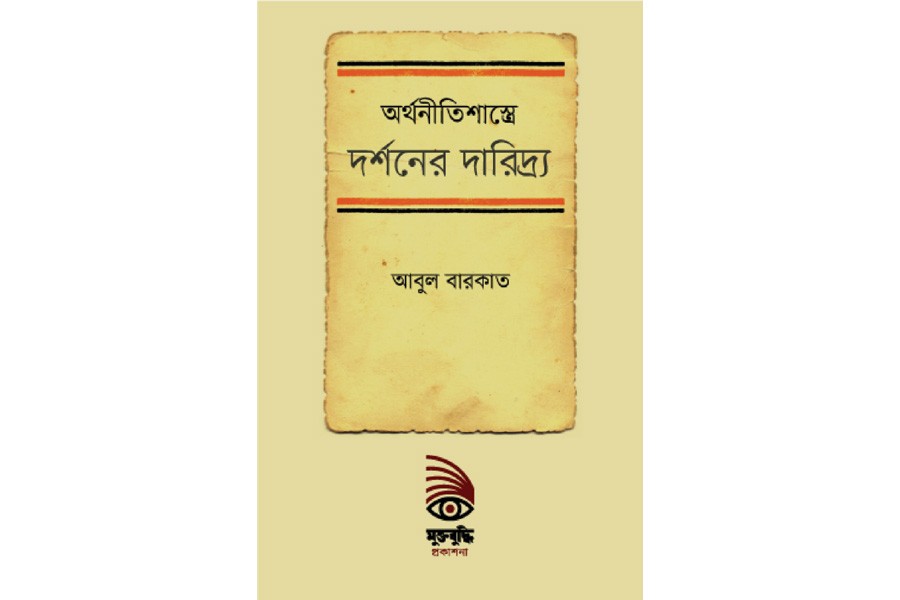Noted economist Professor Abul Barkat has brought out a book on 'economic thoughts'. The book is titled 'Poverty of Philosophy in Economics' (2017). It is a less discussed topic, and the book provides a real scenario of the poverty of collective thoughts, the gap between policy configuration and implementation, mindset poverty, various schools of economics, development-deprivation trap, global trends of development, an unpretentious viewpoint of neo-liberalism and suggestions on the course outline of economics in the era of development conflicts. Basically, the book is root-exploring; and a fundamental and research-based publication.
Abul Barkat dedicates his book to the Department of Economics, University of Dhaka. The author discusses the subject of the poverty of thoughts, not the 'philosophy of poverty'. He has attempted to explore the ancient thoughts of the philosophers Fan Lee, Aristotle, Jenophen, Ibn Khaldun, Chanokyo, Plato etc. He compares their thoughts with the contemporary ones on development. The author takes an in-depth look at the political economy of 'extermination' and injustice as well as reflects on how human beings are discriminated against and deprived.
The book highlights the different schools of economics - the classical school, the Marxian school, the neo-classical school, the institutional school, the Austrian school, the Keynesian school and the behavioural school as well as their functions in development.
This book provides historical evidence of mindset poverty. It can be applied to other disciplines as well. Poverty in recognising other researches and researchers is one kind of mindset poverty. For example, Ebn Taimiyah (1263-1328) had given an outline on price equilibrium, but contemporary literature maintains that Adam Smith (1723-1790) was the father of price equilibrium theory. Abu Yusuf (731-798) and Al Gajjali (1058-1111) had talked about rents and taxes, but modern literatures recognise economist David Recardo (1772-1823) in this regard.
The author has discussed about the philosophy of neo-liberalism. It is an extreme version of free market economy. Global rent-seekers or corporate grabbers and their grand alliance mention 'war on terror'. But contemporary global figures tell us about the 'war of terror', meaning terrorising the world. We know how super-genocide and corporatocracy took place in different countries ? South America, Congo, Rwanda, Western Sahara, Libya, Eastern Africa, Cambodia, Indonesia, Australia, Grenada, Uganda etc in the name of land development, oil extraction, mining and commercial cultivation. The author informs us about how agents of neo-liberalism want to encroach on and capture the primary strategic resources through a liberal conceptual framework. Global resources can be land, water, energy and minerals as well as spare resources. The global alliance wants not just access but absolute ownership, command and control.
The US, the UK, Canada, Australia, France, and Germany belong to the first category. They utilise their own resources as well as have stake in the resources of other countries with multinational companies.
China, Malaysia, India, Brazil and Vietnam belong to the second category .They have developed their institutional capabilities and utilise their natural resources with their own agencies. They have developed these national agencies and are now expanding overseas. India has established a corporation of mineral exploration, national remote survey agency, Indian bureau of mines, Coal India etc. Paraguay, Venezuela, Bolivia, Ecuador and Argentina have ownership of natural resources. They maintain and monitor their natural resources with a strong hand. These countries have treaties with multinational companies who now must work to the best interests of the public and state.
In Sudan, Nigeria, Zimbabwe, Zambia, Angola, Sierra Leone and Columbia, people are victims of different neo-imperialistic countries and multinational companies. They do not know what their own resources are. The general people are deprived of using their own resources. They are also affected by local corporate 'grabbers' and rent seekers.
Finally, the author has placed a suggestion on the syllabus of economics as it determines the global system. We need mathematics, econometrics, statistics, various models for estimation of development, but we have to study history, theology, ethical science, philosophy, sustainable politics, and cultural diversity.
Actually, united we develop and divided we fall. As well, we know how 'statistical politics' can be inequitable towards humans and humanity. So, social inclusion is necessary for collective welfare as economic development will not be sustainable without this inclusion. The author suggests it is the liability of the state to create an enabling environment to trim down inequality, deprivation and discrimination and eradicate all kinds of terrorism and militarism in the interest of the masses.
The author in the book assimilates the thoughts of different thinkers, like Jean-Jacques Rousseau, Plato, Isiah Barlin, Thucydides, George Hegel, Oliver Gold Smith, Noam Chomsky, Marcus Tulius Cicero, Jonathon Swift, George Orwell, Joseph Stiglitz, Nicholas Taleb, Amartya Sen and Van Schendel.
It's a book about political economy, but the writer uses the terms of English literature, philosophy, ethics and theology, and thus makes it reader-friendly. The book has an introduction by Prof. Haider Ali (Denver University, USA). The author takes assistance of 238 references which make it a treasure-trove of knowledge, intellectually stimulating, and a collection of 'inclusive thoughts'.
The reviewer is an environment analyst and associate member of Bangladesh Economic Association.


